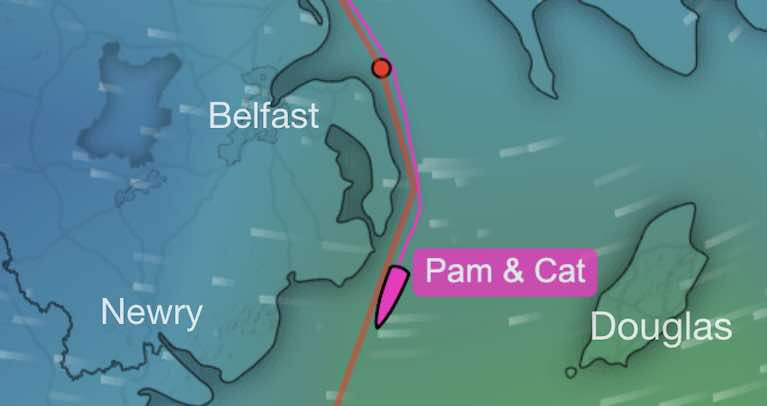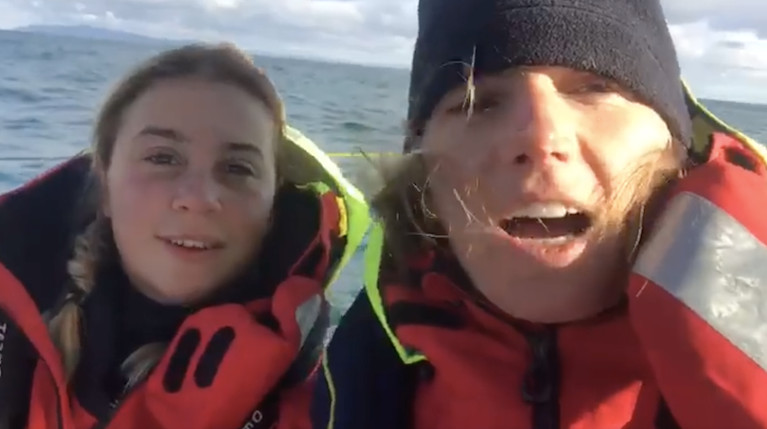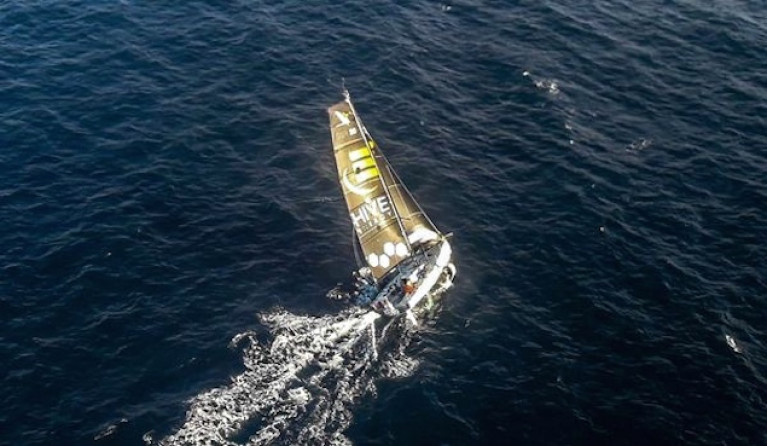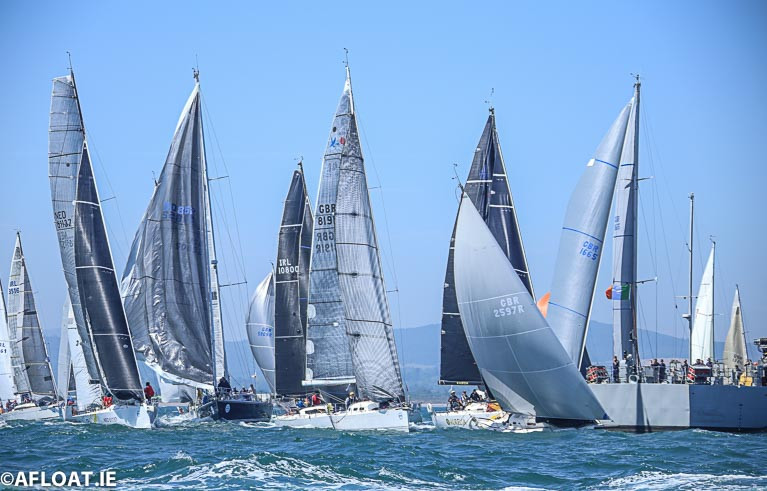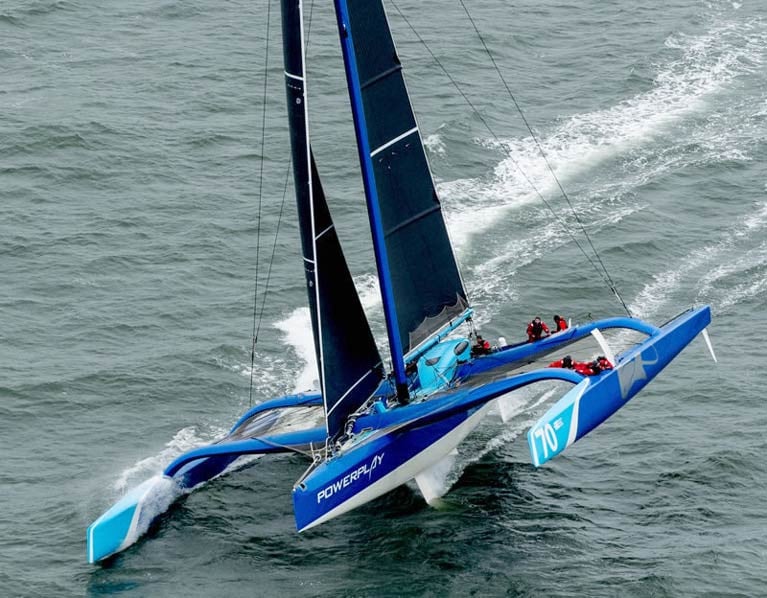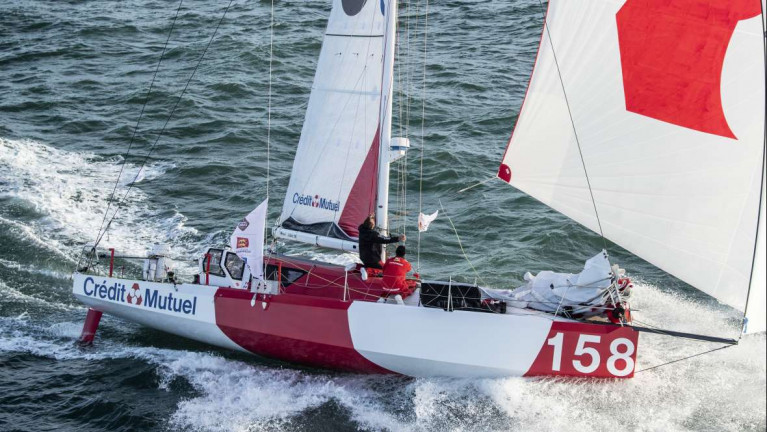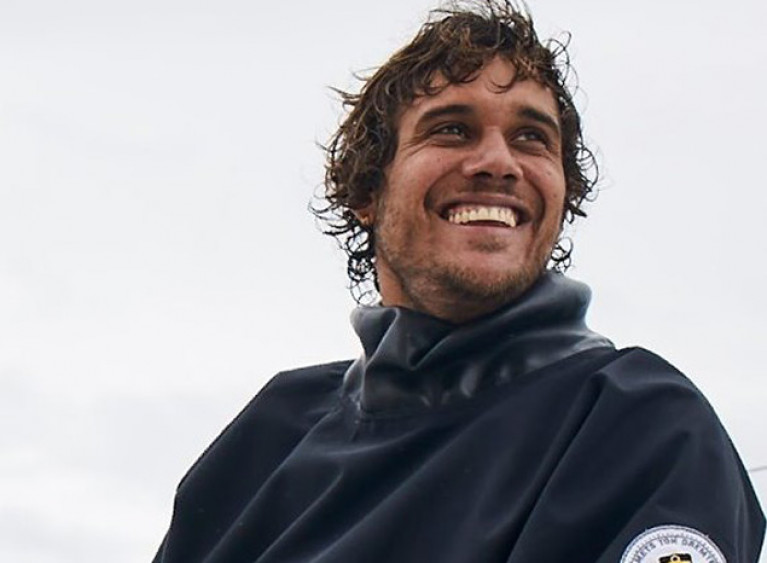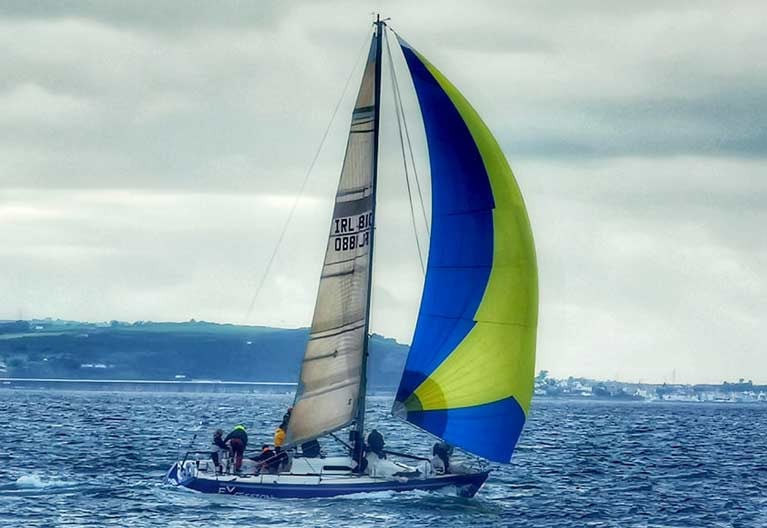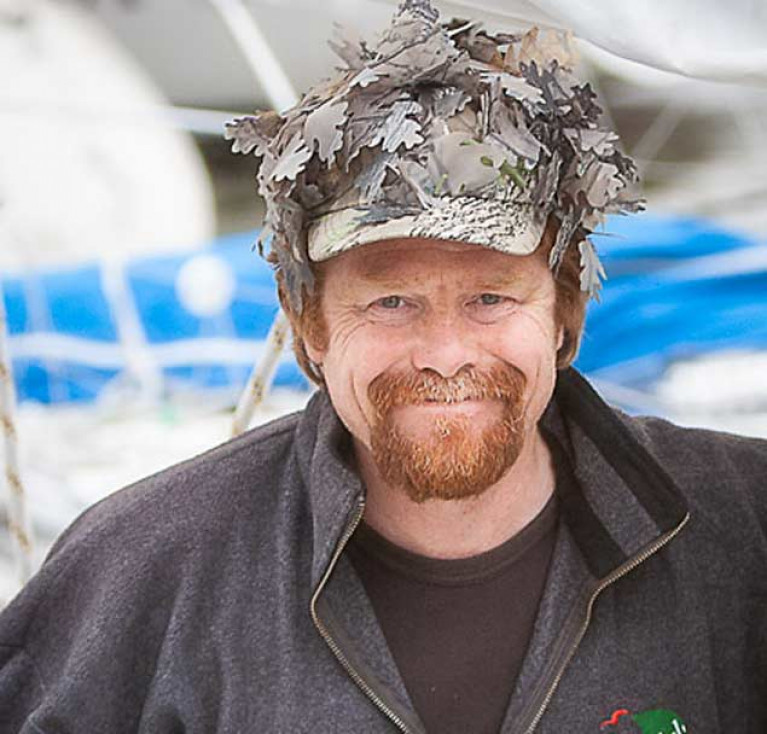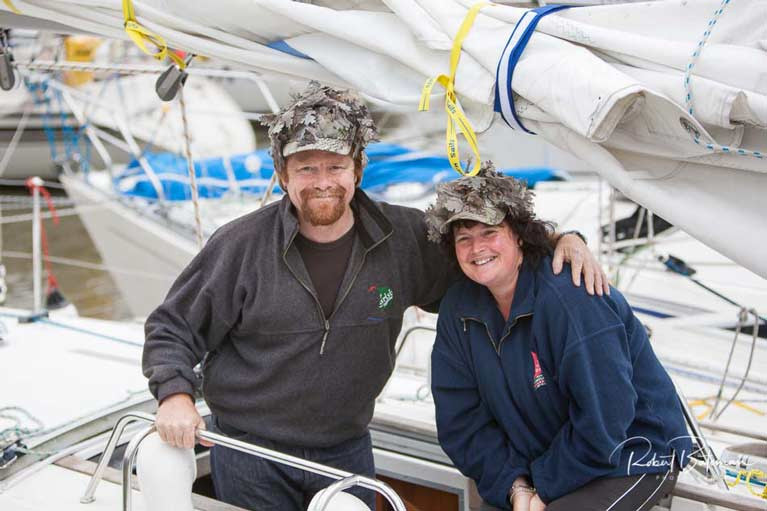Displaying items by tag: Round Ireland
The Force is With Them Again – Female Crew in Maigeanta Iarracht May Make it Round Ireland Within Four Days
Female Two-handed Round Ireland Record Day Four 2100hrs: The situation became transformed. It was like the clicking of a switch. Or so it seemed to those on the edge of their seats ashore, as they watched on screen as the Figaro 3 Iarracht Maigenta struggled with little wind against the last of the ebb tide off the Antrim coast at Glenarm. First, there came the breath of a fresher breeze from between southeast and east to bring the boat to life. And then by 1800hrs, the new flood tide was surging them on their way, zapping two-handed crew Pam Lee and Cat Hunt south across Belfast Lough and past Mew Island in jig time, such that they were tearing along the County Down coast with their speed over the ground comfortably into the double digits.
Admittedly the pace slowed a little as they swept past the South Rock at 2000 hrs and began to get away from the most powerful stream of tide. But they'll still have something of it in their favour until St John's Point is abeam, provided the breeze keeps up.
Sailing Magenta Round Ireland Tracker
On the present rate of going, St John's will be there - though well to the west – around 2130, and this is where things start to get extra-interesting. If they can keep up their beam reaching speed around the 8 knots mark through the water, they can then make the classic hop of going from the last of the south-going flood as it peters out east of the entrance to Carlingford Lough, and make the leap across slack water for an hour or so until they then begin to feel the very first of the ebb in the new tidal system where the flood goes north, but the ebb is favourably going south.
It will be doing so with real determination as it accelerates south past Rockabill. As of 2100, Rockabill is still 48 miles away, while the finish line is 63 miles distant. You do the maths. If this good easterly breeze keeps up and they can be hovering between 7 and 8 knots through the water, the four day circuit is a distinct possibility, as to do it they've to be past the Kish by 0745 hrs tomorrow (Saturday) morning, and the current rate of progress allows them a bit of leeway on that.
But as we've seen, the winds today are in a capricious mood, even if a proper southeaster is in the offing. The tension in this project will be maintained right to the end.
More Uphill Work for Round Ireland's Pam Lee & Cat Hunt
Female Two-handed Round Ireland Record Day Four 1500hrs: The North Channel is one very unforgiving bit of water to go sailing on. It only gives you the gift of a fair tide for just long enough to begin to think that the dark cliffs of the inappropriately-named Fair Head and the gloom-inducing Mull of Kintyre aren't such oppressive bits of coastline after all as you buzz merrily along in the morning sunshine. And then the tide turns. The wind shuts down. And in near calm, you can appreciate only too well the sheer unfeasibly enormous vastness of this bulk of water moving in the wrong direction, struggling as you are to squeeze enough speed out of your boat simply to hold your own until the tide turns again. Meanwhile, the steep coastline becomes spookily claustrophobic.
We left round Ireland two-handed record challengers Pam Lee and Cat Hunt this morning as merry as grigs after they'd swept in past Rathlin with a grand fair flood tide at sometimes better than 12 knots over the ground. And we hoped that there was still enough life left in the flood to carry them well on their way towards the South Rock off the County Down coast, where tidal streams start to be less dominant.
But was not to be. At least they'd got a far as Glenarm, and south of the very worst of the foul tide. But the new ebb soon built up to strength, the wind – such as it was - drew more from the south and eased, and speeds of 2 knots or less over the ground became the order of the day.
Sailing Magenta Round Ireland Tracker
It will be 6 o'clock this evening before they have significant tide in their favour, but then it's good news, as every bit of southing they make taking them closer to the Irish Sea's relatively tide-free western sector. And it all brings them closer to the bit of more active weather that's distantly developing to the far southwest of Ireland, and should be preceded by a decent sou'easter which might even be the leading wind to bring them into Dublin Bay to complete the circuit within four days – deadline is 0745 tomorrow (Saturday).
But for now, they can have to live with seeing the Antrim coast in slow detail, and imagining life in Glenarm Castle up on the heights. It's the stronghold of the Mac Donnells, the Earls of Antrim, who were originally the Lords of the Isles in the Hebrides, but moved their HQ south when they found the real estate was of better quality in Ireland.
However, they never lost their love of the isles, so by tradition, each deceased member of the family is buried upright in the family graveyard on top of the hill so that he or she can look out over the coasts and islands and waterways that were their extensive domain.
But once upon a time, a notably unpopular member of the family died, and none of his relatives could be bothered to come home for the funeral. So the faithful retainers of the descendants of the Lords of the Isles struggled on their own up the hillside with the loathed one's very heavy coffin and buried him head down.
Tide Strongly in Favour of Magenta Round Ireland Duo as They Sweep past Rathlin after a Challenging Night
Female Two-handed Round Ireland Record Day Four 0900hrs: When Pam Lee and Cat Hunt entered Day 3 of their Magenta Project Round Ireland Challenge at 0745 hrs this morning (Friday), they were nearer the Scottish coast than they were to the northern shores of Ireland. But they were reaping the benefit of the new favourable flood tide, after a difficult night spent beating to windward into the Sea of Moyle, the appropriate-sounding ancient name for the tide-riven area between the north of Ireland and the large Scottish southern Hebridean island of Islay.
Back at midnight, they'd got to Inishtrahull. But with the barometer rising, there was every chance that the calm which was settling over central Ireland for the night would spread northward over the sea. Thus any notion of short-tacking inshore along the north Irish Coast, in search of slacker water as the ebb tide ran west at full blast, was abandoned in favour of shaping a course well offshore where southeast to east wind was still to be found, even if there was little or no relenting of the adverse tides.
 Rathlin Island, Ireland's supreme tidal gate
Rathlin Island, Ireland's supreme tidal gate
They were around 5 miles from Islay's southwest headland as they tacked with the new flood starting make properly at 0640 hrs, with speed in a local tidal hot-spot at one stage getting up to 10 knots. And now, at 0840 and out in the less excitable waters getting rapidly clear of the Islay coast with a crisp passage past the supreme tidal gate of Rathlin Island in prospect, they are around 9.4 knots and rising, making the best of a light easterly and a surging fair tide.
Sailing Magenta Round Ireland Tracker
The conditions and their course are such that the tide will help to sharpen the apparent wind strength without making the sea unduly rough, so conditions are maximised for smooth progress by a tired crew brought back to life by real progress after an exceptionally difficult and wearing night.
After they've passed Fair Head and Tor Head on Ireland's northeast corner, they're clear of the worst of the tidal blackspot, and though a favourable tide right through the North Channel to the South Rock Light would be a bonus, as the new ebb begins to start running north again around noon that would be too much to hope for.
But with moderate mainly easterly winds forecast today for the North Channel, and with east to southeast wind indicated for the final leg from the South Rock to the official record line at the Kish Light off Dublin Bay, they've a good chance of continuing in a leading wind and overcoming any unfavourable tides for the rest of the day after the mighty hurdle of Rathlin has been cleared.
Next Magenta update on Afloat.ie will be early this afternoon, but meanwhile, at 0900 hrs they've 136 miles to the finish, and SOG is 10 knots.
Wicklow Sailing Club Cancels Round Ireland Yacht Race 2020
In a decision which will resonate with the national and international sailing community, and following intensive meetings all day, organisers Wicklow Sailing Club in concert with their many stakeholders have decided at 1845hrs today (Monday) that the circumstances of the COVID-19 pandemic make it inadvisable and impossible to stage the SSE Renewables Round Ireland Yacht Race 2020, which had already been put back by two months to August 22nd in the hope of a significant improvement in the general health and hazard situation.
Organisers say a full statement on the cancellation will be issued later this evening (issued Tuesday am - web editor), but meanwhile, the thoughts of all sailors will be with the gallant little Wicklow club, which had been so keenly anticipating and working towards staging the 21st biennial Round Ireland some 40 years after founding the event with just 16 starters in 1980.
Over fifty entries had been received for August's race. Read all Afloat's race updates in the build-up to the 2020 race here.
Afloat is keen to hear sailors views on the cancellation at [email protected]
Update 08.38 Tuesday, July 28:
Press Statement from Wicklow Sailing Club
Global increase in Covid cases forces cancellation of rescheduled SSE Renewables Round Ireland Race
The sharp rise in global Covid-19 cases has forced Wicklow Sailing Club to cancel this year’s SSE Renewables Round Ireland Race, due to start on Saturday 22nd August. The next staging of the blue ribband sailing event will now take place in June 2022.
As early as March of this year, the 21st edition of the race was headed for a record turnout in excess of 60 teams in what would have been the Round Ireland’s 40th Anniversary year.
Following the introduction of initial Covid-19 lockdown restrictions the original start date of June 2020 was postponed to 22nd August to allow time for virus counter-measures to take effect. Even with Covid restrictions in place, entry numbers for this year’s rescheduled race from Irish and international competitors held around the 50-boat mark.
In the months since the postponement, Wicklow Sailing Club has been consulting diligently with various stake-holders including race participants, sponsor SSE Renewables, Wicklow County Council and Irish Sailing among others to agree a range of mitigation measures onshore and offshore to allow the race event to proceed safely while adhering to Covid-19 guidelines.
However, despite these mitigations, Wicklow Sailing Club has taken the decision to cancel this year’s SSE Renewables Round Ireland Race in the best interests of participants and volunteer support crews, and in response to concerns around the recent sharp rise in global Covid-19 cases.
The next edition in 2022 of the 704-nautical mile race that has been dubbed “the Kilimanjaro of Sailing” is unaffected at this time.
“For a time, it seemed like we were on track to stage a successful race albeit with significant mitigation measures that people would understand,” commented Kyran O'Grady, Commodore of Wicklow Sailing Club. “But the global situation with the virus is precarious and while under some control in Ireland now, who knows where we might be in just a few weeks’ time.
“We could easily run the race for entries from the island of Ireland only and possibly restrict visiting international teams from coming ashore before and after the race. But this runs against both the spirit of this classic race and our tradition at Wicklow Sailing Club of welcoming all competitors. Our competitors need certainty as soon as possible and our first priority must always be the safety of participants and those supporting the delivery of this sporting event.”
Race title sponsor SSE Renewables has expressed its support for the decision by Wicklow Sailing Club. Barry Kilcline, Director of Development at SSE Renewables, said: “We have been hugely impressed at the great deal of work invested by Wicklow Sailing Club and other key national and local stakeholders to respond to the impact Covid-19 has had on this year’s staging of the Round Ireland. As the most prominent international offshore sailing event staged in Ireland, the decision to have to cancel this year’s event is clearly disappointing for everyone in the sailing community and in Wicklow in particular.”
“However, clearly in the context of the pandemic the decision to cancel is also the most appropriate and necessary response. As race sponsor Wicklow Sailing Club is assured of our full support in this regard and we will work with the club as it prepares plans for the next staging in 2022.”
Further information about Round Ireland 2022 will be issued in the coming weeks.
Giant MOD 70 Trimaran 'Powerplay' Enters Round Ireland Yacht Race Bringing Entries to 50 So Far
A new Round Ireland Race record speed time is in prospect with the entry of a MOD70 trimaran into the 21st edition of the race from Wicklow.
There is no doubting the appeal of August's classic Irish offshore with the entry of one of the world’s fastest offshore race boats.
Peter Cunningham's high-speed UK giant 'Powerplay' brings entries to 50 so far in the biennial 700-mile circumnavigation.
If conditions permit, Cunningham will be out to beat the outright race record of 38 h 37 min 7 seconds that is is held by another MOD-70, Musandam-Oman Sail and was set in June 2016.
Powerplay follows two more potent international entries received at Race HQ with more to come before the starting gun sounds in one month.
JPK11.80 entry
A Hamburg based Mach 40.3, Rockall has been entered by Christopher Opielok and the UK's Ed Bell has joined the race with the JPK 11.80, Dawn Treader adding to the competition for overall IRC honours.
Mini Transat Winner and 2018 Round Ireland Yacht Race contestant Ian Lipinski has set a Round Britain solo record.
On Friday, 10 July, the Class40 Credit Mutuel skipper crossed the virtual finish line by crossing Cape Lizard, to set this new racing record of 7 days 17 hours, 50 minutes and 48 seconds (subject to verification).
Lipinski broke the record set by Phil Sharp in the Race Around Britain and Ireland race in 2018 by 10 hours 24 minutes and 1 second.
More on this record from Sail Web here.
As regular Afloat readers will know, Lipinski co-skippered a brand new Mach 40 'Corum in the 2018 Round Ireland and got off to a stunning start off Wicklow Head two years ago.
French Class 40 boats are returning to the Irish race track for August's 700-miler too.
Another international entry for August's SSE Renewables Round Ireland Yacht Race adds extra spice to a growing French Class 40 division with the arrival of the Lorient based Mach 40.3, Taras Boulba skippered by Charles-Louis Mourruau.
Overall, it brings entries to the Irish classic to 47, just days before the early bird entry expires and seven weeks before the race start on August 22nd.
Mourruau's Taras Boulba is the second Class 40 boat to enter joining Antoine Magre's Palanad 3 from La Trinite sur Mer.
Class 40 is a monohull sailboat primarily used for short-handed offshore and coastal racing and popular in France.
The French interest is a satisfying return on investment by Race organiser Kyran O'Grady whose pioneering efforts at the Paris Boat Show last December now bear fruit with a bumper international Round Ireland fleet still in prospect.
It is understood the cancellation of Class 40s Transatlantic race due to COVID-19 in May has also led the French sailors to look further afield for racing this year.
Meanwhile, as Afloat previously reported, the Welsh ISORA fleet can still swell Round Ireland Yacht Race entry further with up to six or seven Pwllheli boats yet to enter.
The second Northern Ireland entry for August's Round Ireland Race is, as Afloat previously reported, the Belfast Lough IMX 38 eXcession entered by owners Ruan O'Tiarnaigh from Ballyholme YC, John Harrington (Royal Ulster) and Johnny Mulholland, also from Bangor.
Joining those three will be Kenneth Sharp, Clyde/Ballyholme, Stuart Ogg Donaghadee SC, Jim Tennyson Lough Neagh SC, John O'Connor Portaferry SC, Mark McClughan Royal North of Ireland YC and from Sutton Dinghy Club, O'Tiarnaigh’s old stomping ground in a GP14, is Stephen Boyle.
O'Tiarnaigh has competed in the Round Ireland twice before. In 2006 he was on board Stuart Thwaites’ 31m Konica Minolta from Wellington, New Zealand, taking line honours; and in 2008 as skipper on Galileo, Sean Lemass and Tony Tennyson’s Beneteau 47.7, placing 4th.
Ruan was disappointed not to be able to compete in Cork Week 300 or the RC35 circuit, both cancelled due to COVID 19. He told Afloat, “as my late father Riocard would say, 'One must bend with the bamboo' so when the Round Ireland was re-scheduled, it became the focus of our season. Our only issue at this stage is getting sufficient crew qualified with the OSR as COVID restrictions are preventing the mandatory life raft training being run, but we are working with the course suppliers to ensure that we shall be compliant in good time”.
Father and son duo Johnny and Jamie Ritchie in the Dufour 41 Classic Mingulay, also from RUYC, is the other Northern Ireland entry.
I got a strong, supportive reaction to last week’s Podcast in which Glandore Harbour Yacht Club’s Sailing Secretary Hal Andrews, said it was “a nightmare” trying to organise sailing with social distancing. The response to his view was overwhelmingly supportive.
Hal Emailed me since the Podcast to say that he hoped his assessment was “not too gloomy.” He did not need to worry. It reflected most people’s thinking and mine too.
While the national sailing authority continues to seek changes or exceptions for the boating world – and it is to be hoped they can – until early August social distancing and limits on family units seem to leave solo sailing as the main opportunity.
Young sailors have been taking advantage of that on the waters of Cork Harbour in the glorious weather of the past few days. There have also been a few cruisers, apparently with families, venturing forth.
But I cannot see crewed cruiser racing resuming for some time. I know of very few entirely crewed boats from family units in the same household.
One family boat and crew made news during the week when the Director of the Sovereign's Cup at Kinsale Yacht Club, Tony Kingston, announced the family’s Swan 40, Shindig, would be on the Wicklow Sailing Club Round Ireland start line on Saturday, August 22 - in the two/handed class.
Tony, a Cork Harbour port pilot, is my guest on this week’s Podcast (below)
Race regular Tony Kingston from Kinsale Yacht Club is the latest entry into the Round Ireland Yacht Race in his Swan 40, Shindig.
It brings entries back up to 40 so far allowing for a number of dropouts due to COVID-19.
As Afloat previously reported, three new arrivals means the 21st-anniversary fleet remains in a strong position with 12 weeks to the first gun off Wicklow.
Kingston, the KYC Sovereign's Cup Race director, placed 12th overall in the 1994 race in Amazing Grace and, as photographed above, raced two-handed in 2008 with Alice Kingston in Cracker to finish 21st.


























